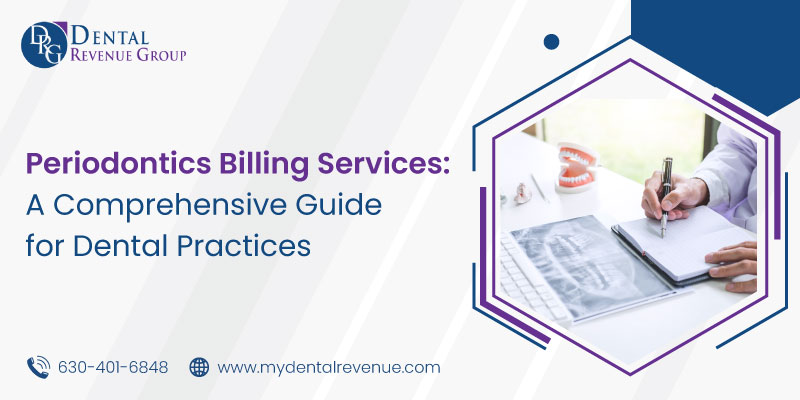Running a successful dental practice requires efficient billing, administrative processes, and excellent patient care. It becomes crucial to understand periodontics billing services clearly for dental practices. This comprehensive guide will explore everything you need to know about periodontics billing services and how they can benefit your practice. We will also discuss the role of a dental billing company in streamlining your billing processes.
Understanding Periodontics Billing Services
Periodontics focuses on the prevention, diagnosis, and treatment of conditions related to gum diseases and the supporting structure of the teeth. Due to the complexity of periodontal treatments and the wide range of procedures involved, accurate billing is vital to prevent revenue losses, claim denials, and compliance issues. Periodontics billing services involve the management of financial transactions related to periodontal treatments. This includes documenting, processing, and submitting claims to insurance companies and handling patient invoices and payments. It is essential to have well-organized billing procedures to ensure timely reimbursements and accurate financial reporting.
Understanding Dental Insurance
Periodontics billing services play a crucial role in helping dental practices navigate the complexities of dental insurance. Understanding dental insurance is essential for efficient billing and revenue cycle management. Here are some key aspects that periodontics billing services need to comprehend:
Coverage and Benefits:
Each dental insurance plan has its own coverage and benefits. Periodontics billing services must thoroughly understand the terms of various insurance plans to ensure accurate billing and claim submissions.
Dental Codes:
Dental procedures in periodontics are categorized using specific dental codes, such as Current Procedural Terminology (CPT) codes and Dental Procedure Codes (CDT). Billing services must be well-versed in these codes to bill insurance companies correctly.
Pre-Authorizations:
Some periodontal procedures may require pre-authorization from insurance companies before they are performed. Billing services need to handle the pre-authorization process efficiently to prevent claim denials.
Co-payments and Deductibles:
Dental insurance often involves co-payments and deductibles that patients are responsible for. Billing services must communicate these financial obligations clearly to patients and collect payments accurately.
Claim Submission:
Timely and accurate claim submission is crucial for prompt reimbursement. Periodontics billing services need to ensure that all necessary documentation and codes are included in claim submissions to avoid delays and rejections.
EOB Interpretation:
Periodontics billing services should be skilled in interpreting Explanation of Benefits (EOB) statements from insurance companies to resolve discrepancies and handle appeals, if necessary.
Common Periodontics Billing Challenges In Dental Practices
Periodontics billing services can face various challenges, such as:
Complex Coding
Periodontics involves many procedures, and correctly coding them can be challenging. Errors in coding may lead to claim denials or underpayments.
Insurance Verification
Verifying patient insurance coverage and benefits is time-consuming but crucial to avoid claim rejections and billing disputes.
Claim Denials and Appeals
Periodontics billing services often encounter claim denials due to various reasons. Handling appeals and resubmissions is necessary to secure rightful reimbursements.
Coordination of Benefits (COB)
Determining primary and secondary insurance coverage can be complicated, and failure to do so correctly may lead to billing discrepancies.
Unpaid Claims
Following up on unpaid claims and outstanding balances requires dedicated efforts and persistence to optimize revenue collection.
Compliance and Regulatory Changes
Staying up-to-date with changing regulations and compliance standards in the dental industry is essential to avoid legal issues and penalties.
Dental billing companies play a pivotal role in overcoming these challenges and ensuring a smooth revenue cycle for dental practices, allowing them to focus on delivering top-notch periodontal care to their patients.
Key Benefits of Outsourcing Periodontics Billing Services
Outsourcing periodontics billing services to a specialized dental billing company can offer several advantages to dental practices. Some of the key benefits include:
Expertise and Compliance
Dental billing companies have experienced professionals well-versed in insurance billing and coding complexities. They stay updated with the latest industry regulations, ensuring compliance and minimizing the risk of claim denials.
Maximized Reimbursements
By leveraging their expertise, dental billing companies can optimize billing processes, leading to faster and higher reimbursements.
Reduced Errors
Trained billing professionals are less likely to make errors, resulting in fewer claim rejections and faster reimbursement.
Improved Efficiency
Outsourcing billing services frees up your staff’s time, allowing them to focus on patient care. It also reduces the administrative burden and eliminates the need for in-house training on billing procedures.
Claims Management
Handling the entire claims process, from verification and submission to follow-up and appeals, ensures accurate and timely reimbursements.
Patient Billing
Managing patient invoices, handling inquiries, and collecting payments on behalf of the dental practice help maintain a smooth revenue cycle.
Reporting and Analysis
Dental billing companies generate detailed reports and financial analyses, providing valuable insights for improving revenue management and identifying areas of improvement.
Steps for Implementing Periodontics Billing Services
Implementing periodontics billing services in a dental practice requires careful planning and execution. Follow these steps to integrate specialized billing services for periodontal treatments successfully:
Step 1: Research and Identify Billing Service Providers
Start by researching reputable billing service providers that specialize in periodontics. Look for companies with a proven track record in dental billing, especially focusing on periodontal procedures. Check reviews, testimonials, and references to gauge their reliability and expertise.
Step 2: Assess Your Practice’s Billing Needs
Access the current billing processes of your practice and identify areas that require improvement. Consider the volume of periodontal treatments you perform, the complexity of procedures, and any recurring billing issues or denials. This assessment will help you understand what specific billing services your practice requires.
Step 3: Conduct a Cost-Benefit Analysis
Compare the costs of outsourcing periodontics billing services with the potential benefits. Calculate the expenses of maintaining an in-house billing department, including salaries, software, and training. Then, compare it with the cost of hiring a billing service provider. Factor in the potential increase in revenue and efficiency that specialized billing services can bring.
Step 4: Select the Right Billing Service Provider
Choose the billing service provider that best fits your practice’s needs based on your research and cost-benefit analysis. Consider factors like expertise, reputation, technology capabilities, and customer support.
Step 5: Training and Onboarding
Once you’ve selected a billing service provider, ensure that your staff receives appropriate training on the new billing processes and integrated electronic health record (EHR) systems. Effective communication between your practice and the billing service provider is crucial for a seamless transition.
Step 6: Review and Update Billing Policies
Review your practice’s billing policies and procedures to align them with the new billing service. Ensure that everyone involved, from the front desk staff to the dentists, is aware of any changes to billing protocols.
Step 7: Implement a Quality Control System
Establish a quality control system to monitor the accuracy and efficiency of the billing service. Regularly review billing reports and track the progress of claim submissions and reimbursements. This will identify any issues early and make necessary adjustments to ensure optimal outcomes.
Step 8: Monitor Key Performance Indicators (KPIs)
Define and track key performance indicators related to billing, such as claim acceptance rate, average reimbursement time, and revenue cycle metrics. Analyzing these KPIs will provide insights into the billing service’s effectiveness and identify improvement areas.
Step 9: Regularly Communicate with the Billing Service Provider
Maintain open communication with the billing service provider. Regularly discuss any billing-related issues, provide feedback, and ask for updates on the performance of the service.
By following these steps and collaborating effectively with your chosen billing service provider, you can successfully implement periodontics billing services and improve your dental practice’s financial health and efficiency.
Conclusion
Effective periodontics billing services are essential for the financial success of dental practices specializing in periodontics. Outsourcing billing services to a dental billing company can optimize revenue cycles, streamline administrative tasks, and allow dental professionals to focus on patient care. By understanding the key aspects of periodontics billing services and their benefits, dental practices can focus on providing quality patient care while maintaining a steady revenue flow for long-term success.
Contact us today to learn more about periodontics billing services!











